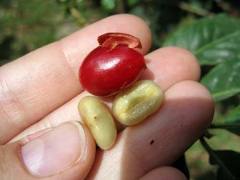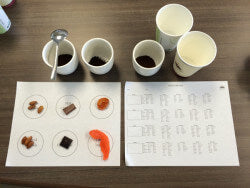The other day one of my staff asked me why lighter roasted coffee has more caffeine than darker roasted coffee. I explained to him that two equal sized beans regardless of their roast profile have the same level of caffeine. He was shocked and asked me why. That led me to creating this list of fun facts for you guys.

Contrary to popular belief, caffeine is the only chemical component in coffee that does not get altered by the roasting process.

Coffee beans contain six primary organic acids: Lactic, Quinic, Acetic, Citric, Malic and Phosphoric. During my Q Grader course we had to blind taste and identify each of these. It was gross.

The coffee bean is actually the seed of the coffee tree, the pit inside the coffee cherry.

There are two main varietals of coffee, Arabica and Robusta. Arabic beans are used in all specialty coffees. Robusta is used for more commercial-type coffees.

The optimum water temperature for brewing coffee is 200 degrees, plus or minus two degrees.

The proper ratio of water to coffee is a range of 16/18 to 1. This means "16 or 18 parts water to 1 part coffee. If you hate math, assume you need 20 grams of coffee for 12oz of water.

A mature coffee tree produces 1lb of roasted coffee a year. Imagine how many coffees trees there are in the world!

The term "cup of Joe" stems from American soldiers in World War II, "G.I. Joes" consumed large amounts of coffee because Maxwell Instant Coffee was included in their rations.

Coffee was first discovered in Ethiopia after a goat herder named Kaldi noticed that his goats did not sleep at nights, and became wildly active after eating coffee berries.

Don't mistake fragrance and aroma as the same thing. Fragrance is used to describe the smell of dry coffee while aroma is used for wet coffee.

Photo credit: Bigstock






